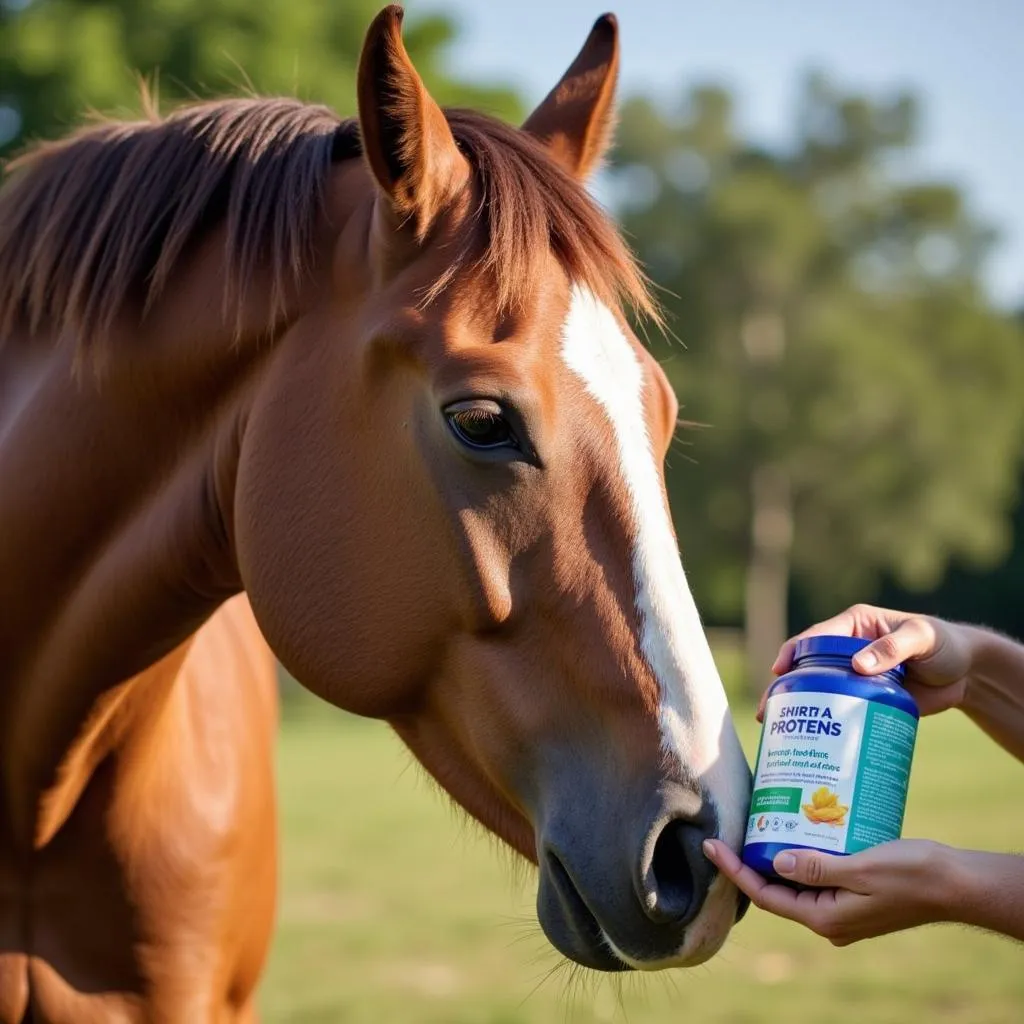Protein is an essential nutrient for horses, playing a crucial role in muscle growth, tissue repair, and overall health. While horses can generally obtain enough protein from their diet, there may be situations where supplementing their feed with protein is beneficial. This article will explore the world of Protein Supplements For Horses, helping you understand when they are necessary, how to choose the right supplement, and how to safely incorporate them into your horse’s feeding plan.
Why Supplement with Protein?
While most horses get enough protein from their diet, some may require additional protein supplementation due to various factors such as:
- High-performance horses: Horses engaged in strenuous activities like racing, show jumping, or endurance riding require extra protein to support muscle growth, recovery, and maintain peak performance.
- Growing horses: Young horses experiencing rapid growth need a higher protein intake to support their developing muscles and bones.
- Pregnant and lactating mares: Pregnant and lactating mares have increased protein needs to nourish their developing foals and produce milk.
- Horses recovering from illness or injury: Horses recovering from surgery, illness, or injury require extra protein to support tissue repair and recovery.
- Horses with specific health conditions: Certain conditions like Cushing’s disease or metabolic syndrome can affect protein metabolism and necessitate supplementation.
Types of Protein Supplements for Horses
There are various protein supplements available for horses, each with its own composition and benefits:
- Soybean meal: A common and affordable protein source, soybean meal is readily digestible and provides a balanced amino acid profile.
- Cottonseed meal: Another cost-effective option, cottonseed meal offers a high protein content but should be introduced gradually due to its potential for digestive upset.
- Linseed meal: A good source of protein and omega-3 fatty acids, linseed meal can also help improve coat health and reduce inflammation.
- Pea protein: This plant-based protein source is hypoallergenic and easily digestible, making it suitable for horses with sensitivities or allergies.
- Blood meal: Derived from animal blood, blood meal is a highly concentrated source of protein but should be used cautiously as it can be unpalatable to some horses.
Choosing the Right Protein Supplement
When choosing a protein supplement for your horse, it’s essential to consider several factors:
- Protein content: The protein content of a supplement is typically expressed as a percentage, and should be chosen based on your horse’s individual needs.
- Digestibility: Look for supplements with high digestibility to ensure your horse can efficiently absorb the protein.
- Amino acid profile: Ensure the supplement contains a balanced amino acid profile to meet your horse’s specific requirements.
- Safety and quality: Select supplements from reputable manufacturers that adhere to strict quality control standards.
- Palatability: Choose a supplement that your horse will readily accept, as forcing them to eat something they don’t like can lead to digestive issues.
How to Incorporate Protein Supplements
To safely incorporate protein supplements into your horse’s feeding plan, follow these guidelines:
- Start slowly: Begin with a small amount of the supplement and gradually increase the amount over a few days.
- Monitor your horse: Watch for any signs of digestive upset, such as diarrhea, colic, or loss of appetite. If you notice any adverse reactions, discontinue the supplement and consult your veterinarian.
- Balance the diet: Ensure your horse’s diet includes a variety of other nutrients, including carbohydrates, fats, vitamins, and minerals.
- Consult your veterinarian: It’s always advisable to consult your veterinarian before making any significant changes to your horse’s diet, including adding protein supplements.
 Feeding a protein supplement to a horse
Feeding a protein supplement to a horse
FAQs about Protein Supplements for Horses
Q: Can I give my horse too much protein?
A: Yes, it’s possible to overfeed your horse protein. Excess protein can lead to digestive issues, and in the long run, can strain the kidneys. It’s crucial to consult with your veterinarian to determine the appropriate protein intake for your horse based on its individual needs.
Q: Are there any side effects of protein supplements?
A: Some horses may experience digestive issues, like diarrhea or colic, when first introduced to protein supplements. These side effects are usually mild and temporary, but if you notice any persistent or severe symptoms, consult your veterinarian.
Q: When is the best time to feed protein supplements?
A: The best time to feed protein supplements is typically in the morning or evening, along with your horse’s regular feed. However, it’s best to consult with your veterinarian for specific recommendations based on your horse’s needs and schedule.
Q: Can protein supplements be used for all horses?
A: While protein supplements can be beneficial for many horses, they are not suitable for all horses. For example, horses with kidney issues may need to restrict their protein intake. Always consult with your veterinarian to determine if protein supplements are appropriate for your horse.
Conclusion
Protein supplements can be a valuable tool to ensure your horse receives adequate protein intake, particularly during periods of high demand. However, it’s crucial to choose the right supplement, incorporate it gradually, and monitor your horse for any adverse reactions. By understanding the role of protein in horse nutrition and following the tips outlined in this article, you can help your horse thrive and reach its full potential.
If you have any concerns or questions about protein supplements for your horse, remember to contact your veterinarian or our team at Justus Horses USA. We’re here to help you provide the best care for your equine companion.